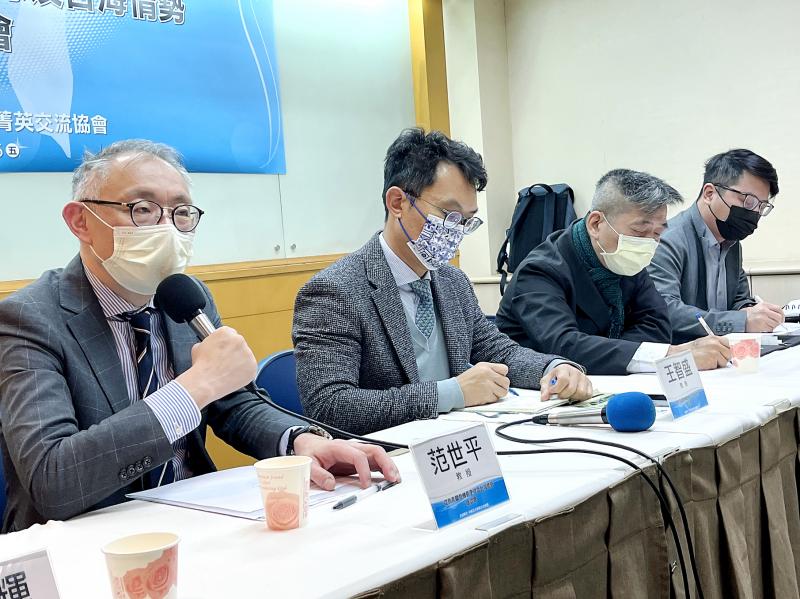Comparing the situations in Taiwan and Ukraine is inappropriate, Taiwanese academics told a forum in Taipei yesterday, highlighting that the conditions the two nations are facing, including their locations as well as their geopolitical and international trade position, are entirely different.
Ukraine has a land border with Russia and is vulnerable to a large-scale land invasion, while Taiwan is separated from China by the Taiwan Strait, Institute for National Defense and Security Research senior analyst Su Tzu-yun (蘇紫雲) told the event hosted by the Association of Chinese Elite Leadership.
Taiwan’s semiconductor industry, which has proven to be critical for global supply chains, and shipping routes to Japan through Taiwanese waters ensure that other countries’ national interests overlap with Taiwan’s, Su said.

Photo: CNA
Meanwhile, the Ukrainian economy is focused on agriculture and traditional industry, he said.
Unlike Taiwan, Ukraine does not occupy a “special place” in US politics, and its strategic value is far less pronounced, National Taiwan Normal University professor Fan Shih-ping (范世平) said.
As Taiwan is part of the first island chain, loosing it to China would endanger Guam, Hawaii and even the US west coast, Fan said.
Taiwan’s semiconductor industry is crucial to the world, so a Chinese invasion would have a far greater effect on global markets, he added.
The Taiwan issue is well-known in the international community, Fan said, citing as examples British Prime Minister Boris Johnson and Australian Prime Minister Scott Morrison mentioning Taiwan when speaking of the Ukraine conflict.
Ukraine became overly reliant on US and NATO promises, as its defense industry fell into disrepair after the 2014 Minsk agreement, he said.
Russia’s goal is regime change in Ukraine, while China’s ambition would be incorporating Taiwan, Cross-Strait Policy Association researcher Wu Se-chih (吳瑟致) said.
Drawing conclusions from the Ukraine conflict is a logical fallacy, Wu said, denying media reports saying that today’s events in Ukraine would be replicated in Taiwan one day.
Private entities should leave it to the government to make such far-reaching statements, he added.

DAREDEVIL: Honnold said it had always been a dream of his to climb Taipei 101, while a Netflix producer said the skyscraper was ‘a real icon of this country’ US climber Alex Honnold yesterday took on Taiwan’s tallest building, becoming the first person to scale Taipei 101 without a rope, harness or safety net. Hundreds of spectators gathered at the base of the 101-story skyscraper to watch Honnold, 40, embark on his daredevil feat, which was also broadcast live on Netflix. Dressed in a red T-shirt and yellow custom-made climbing shoes, Honnold swiftly moved up the southeast face of the glass and steel building. At one point, he stepped onto a platform midway up to wave down at fans and onlookers who were taking photos. People watching from inside

A Vietnamese migrant worker yesterday won NT$12 million (US$379,627) on a Lunar New Year scratch card in Kaohsiung as part of Taiwan Lottery Co’s (台灣彩券) “NT$12 Million Grand Fortune” (1200萬大吉利) game. The man was the first top-prize winner of the new game launched on Jan. 6 to mark the Lunar New Year. Three Vietnamese migrant workers visited a Taiwan Lottery shop on Xinyue Street in Kaohsiung’s Gangshan District (崗山), a store representative said. The player bought multiple tickets and, after winning nothing, held the final lottery ticket in one hand and rubbed the store’s statue of the Maitreya Buddha’s belly with the other,

‘NATO-PLUS’: ‘Our strategic partners in the Indo-Pacific are facing increasing aggression by the Chinese Communist Party,’ US Representative Rob Wittman said The US House of Representatives on Monday released its version of the Consolidated Appropriations Act, which includes US$1.15 billion to support security cooperation with Taiwan. The omnibus act, covering US$1.2 trillion of spending, allocates US$1 billion for the Taiwan Security Cooperation Initiative, as well as US$150 million for the replacement of defense articles and reimbursement of defense services provided to Taiwan. The fund allocations were based on the US National Defense Authorization Act for fiscal 2026 that was passed by the US Congress last month and authorized up to US$1 billion to the US Defense Security Cooperation Agency in support of the

HIGH-TECH DEAL: Chipmakers that expand in the US would be able to import up to 2.5 times their new capacity with no extra tariffs during an approved construction period Taiwan aims to build a “democratic” high-tech supply chain with the US and form a strategic artificial intelligence (AI) partnership under the new tariffs deal it sealed with Washington last week, Taipei’s top negotiator in the talks said yesterday. US President Donald Trump has pushed Taiwan, a major producer of semiconductors which runs a large trade surplus with the US, to invest more in the US, specifically in chips that power AI. Under the terms of the long-negotiated deal, chipmakers such as Taiwan Semiconductor Manufacturing Co (TSMC, 台積電) that expand US production would incur a lower tariff on semiconductors or related manufacturing